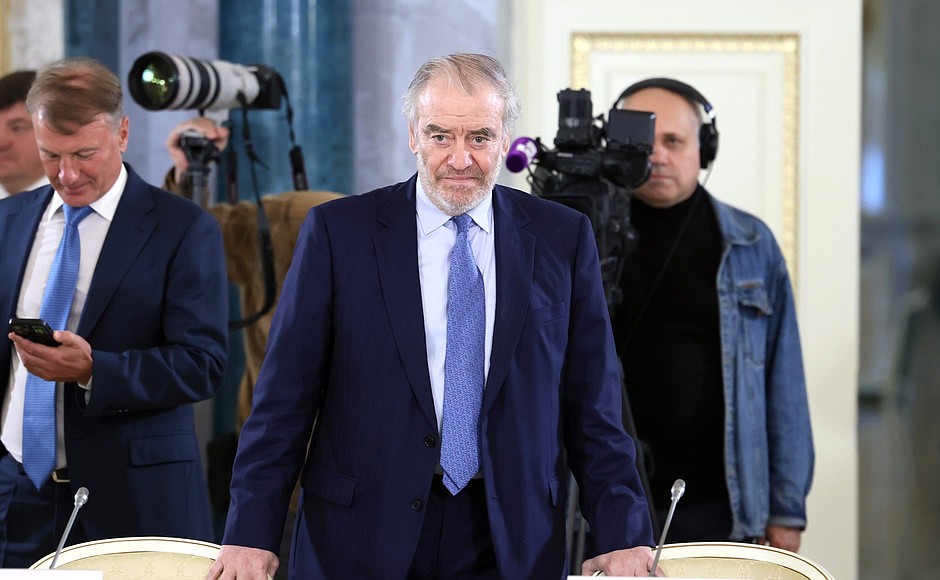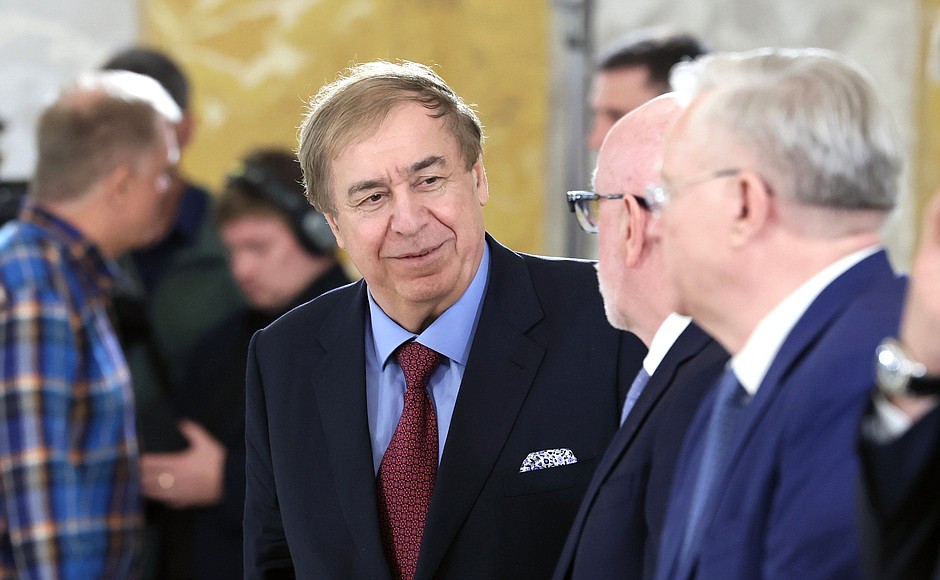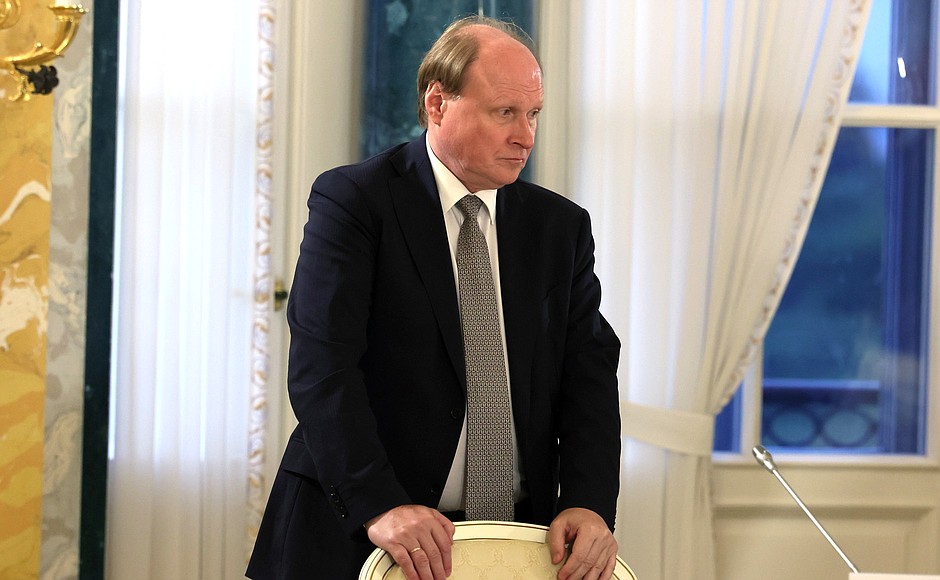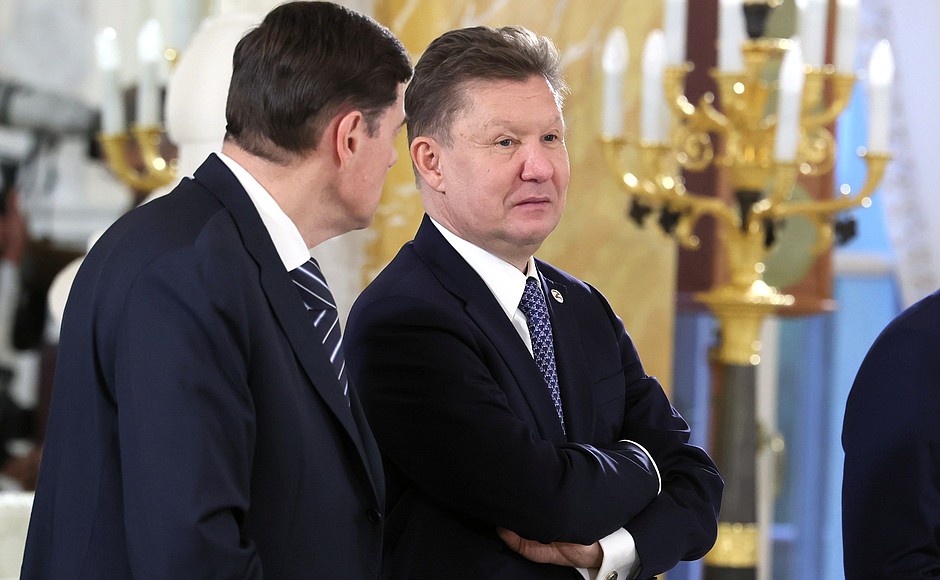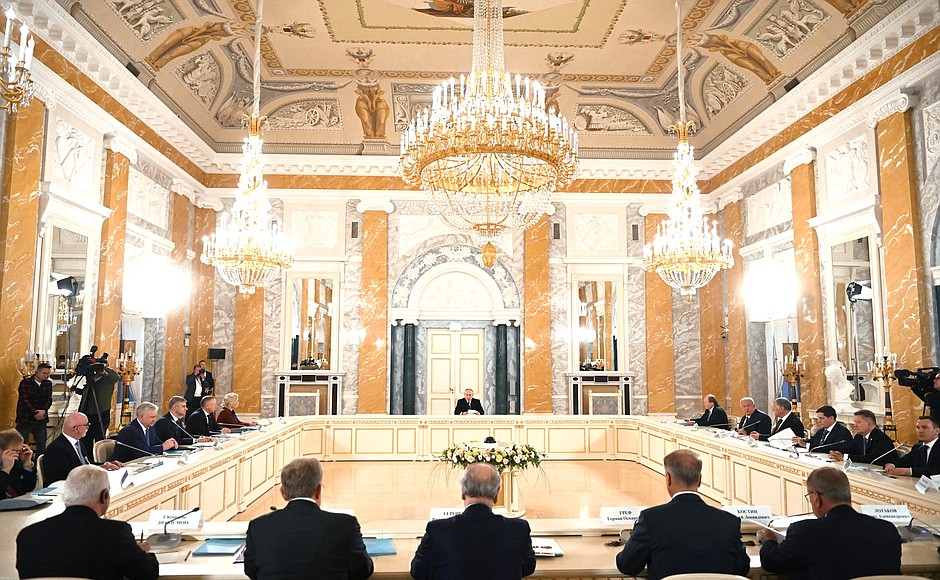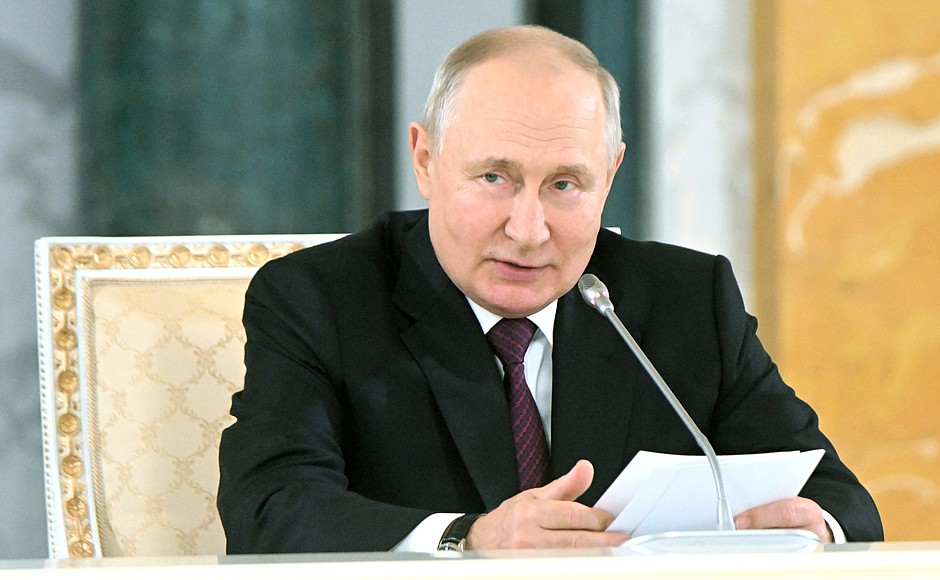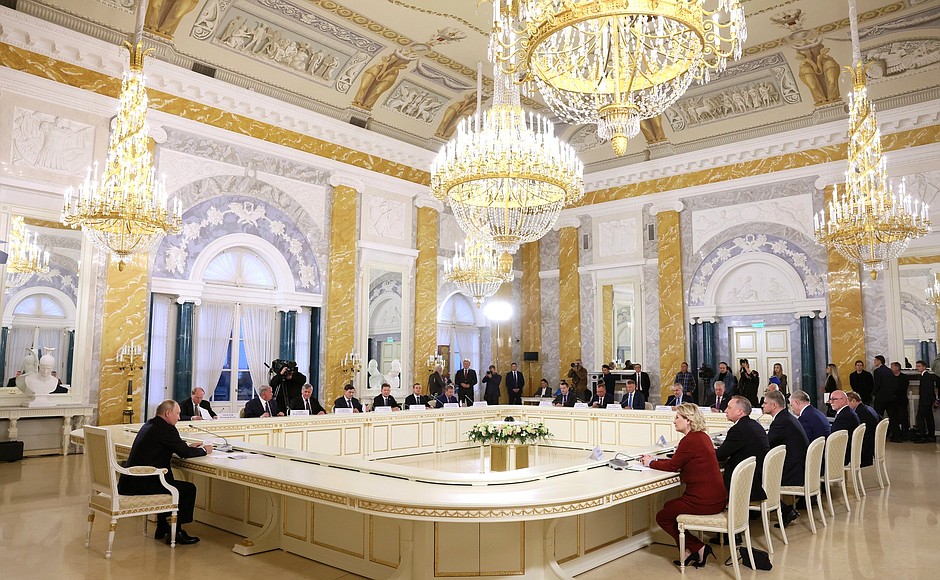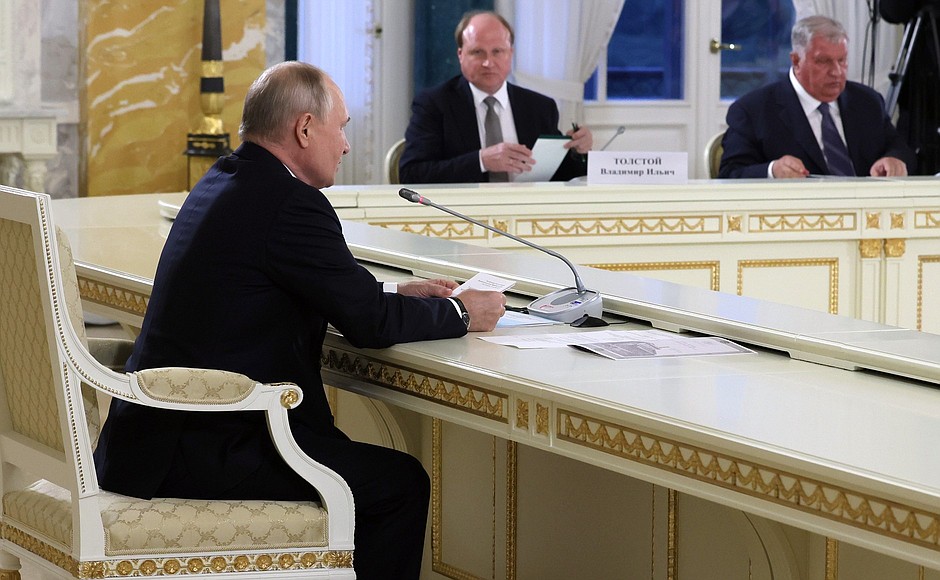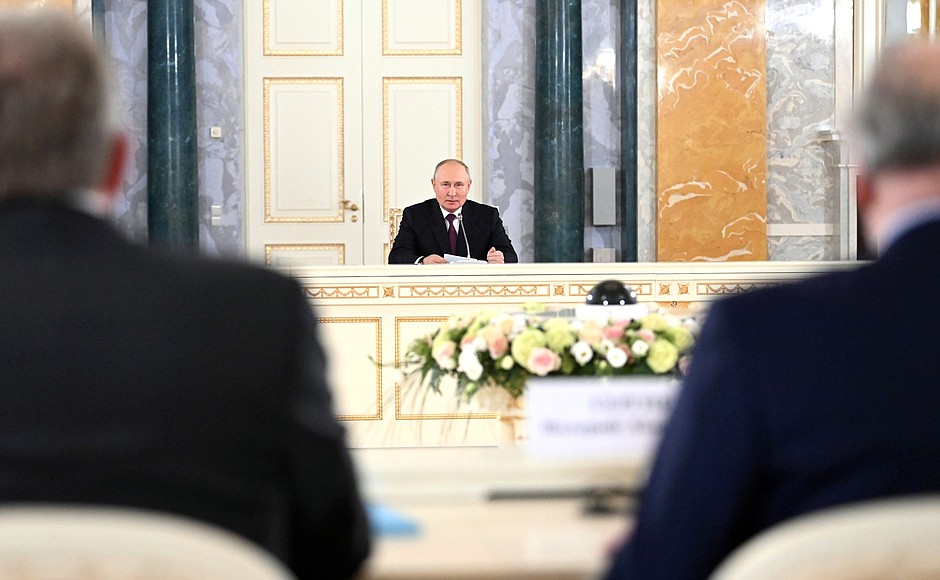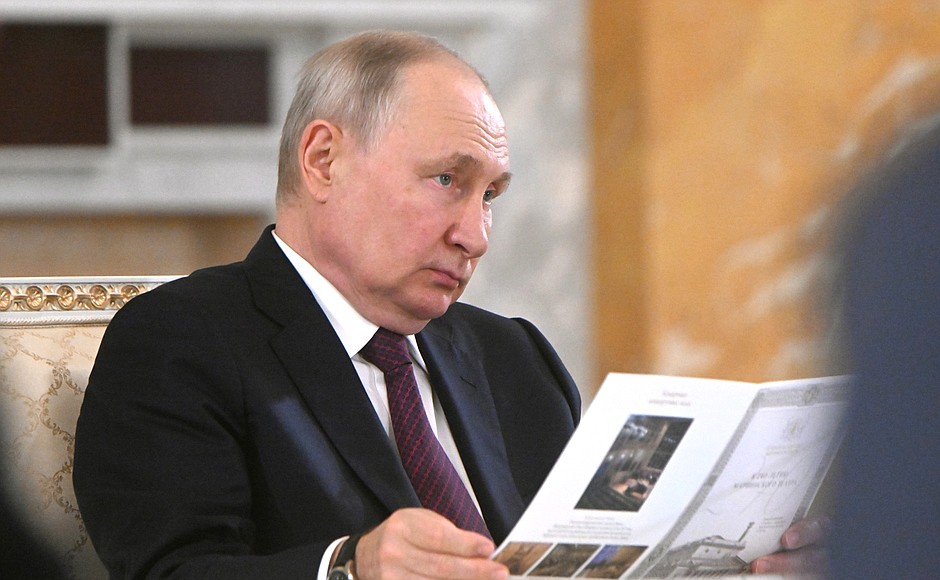President of Russia Vladimir Putin: Friends, good afternoon.
Very soon, on October 5, the legendary Mariinsky Theatre will mark its 240th anniversary.
I wish all the very best to the staff of the theatre, the veterans of this famous company, all lovers of opera, ballet, classical music and certainly all the friends and partners of the theatre.
Today, at this meeting of the Mariinsky Board of Trustees, we will discuss further development, talk about current affairs, and consider what can and should be done in the near future.
Mr Gergiev [Artistic Director and Director of the Mariinsky Theatre] will tell you what has been done, what problems need to be addressed, and what is planned for the future. I assume everyone knows that the celebrated company’s plans and goals are impressive, and the geography of the company’s touring is extensive.
The Mariinsky Theatre is unique in terms of the number of branches. In addition to the three venues in St Petersburg, there are the Primorsky Stage in Vladivostok and two branches in Vladikavkaz, which have been successful. I would like to thank Mariinsky management, every creative and technical specialist for taking on this grand and important mission of making world-class productions available to residents in various regions of Russia.
Another branch of the Mariinsky Theater will open in Kemerovo as part of a new cultural cluster at the end of 2024. It will be the seventh permanent venue where audiences can appreciate the skill of the large Mariinsky troupe and other leading artists.
The Mariinsky Theatre is truly one of the most talented and prolific companies not only in Russia, but in the world, and the members of the Board of Trustees should certainly take credit for that, and I thank you all.
I know that you are helping the company with their core activities as well as with major cultural and educational initiatives. Suffice it to mention the Moscow Easter Festival and the Stars of the White Nights festival, which are held annually throughout the country and are highly popular with the public.
Also, patrons’ sponsorship supports major concert programmes to mark the anniversaries of great composers and choreographers, online projects, streams of the best performances; and the company’s repertoire is constantly updated.
Your support matters even more today, as Russian art, Russian artists are facing well-known and rather aggressive discrimination and attempts to cancel our history, our music, ballet, theater, literature, painting, and our achievements in this area.
It is obvious that those who have chosen this approach and seek to erase Russia and Russian culture from world heritage are first of all robbing themselves. Their actions are small when put in perspective by the greatness of Russian art. I will not go into detail here – we all know what I am talking about.
It is my pleasure to give the floor to Maestro Gergiev. Please, Mr Gergiev.
Artistic Director and Director of the Mariinsky Theatre Valery Gergiev: Thank you very much, Mr President.
So, we are approaching the 240th anniversary of the famous theatre. Its story began when Empress Catherine II issued a decree to create this wonderful theatre in 1783. Later, Alexander II, another Russian emperor, gave the company a truly royal gift – the building, built in 1860, still serves thousands and thousands of opera and ballet lovers.
As everyone knows, the second stage of the Mariinsky Theatre has already marked its first decade. It feels like we opened that new theatre only yesterday. The second venue expanded our capabilities incredibly. In addition, there is the concert hall, another high-quality venue with incredible acoustics that was built with the great support of the Board of Trustees – and this is something that many of those here know and appreciate. It really was a fast-paced project and a great gift to St Petersburg, completed in 15 months, which gave us an incredibly wide range of opportunities. But it did lead to more complex questions that I will talk about later.
Now I would like to say that performing in St Petersburg, our home city, has always been a priority for the Mariinsky troupe. We have significantly increased the number of performances here. I think we now perform eight, nine, or even ten times more often here today than we did 15–17 years ago, and this makes us happy. We offer plenty of children's productions, programmes for young audiences.
We perform as part of the Easter Festival. Although officially it’s Moscow Easter Festival, but it is actually a festival “of Moscow and All Russia,” if I can say that. A large group toured about 70 regions of Russia including an orchestra, in most cases, and sometimes an orchestra, a choir, and soloists. We know a lot about most regions’ capabilities and challenges.
This has become incredibly important, especially in light of a project launched two years ago that inspired us very much, when we began to perform in Tikhvin, which is the birthplace of [Nikolai] Rimsky-Korsakov. This beautiful part of Russia, with its large monastery, our greatest icon, the Rimsky-Korsakov House Museum, and a theatre built in Soviet times, makes a perfect setting for this wonderful festival commemorating Nikolai Rimsky-Korsakov, who was born in Tikhvin.
Just recently, we performed in Pskov, the birthplace of Modest Mussorgsky. Five thousand people came to the Pskov Kremlin square; we were lucky to have good weather. And Boris Godunov sounded to me like another good monument to the Pskov land, in terms of the admiration the locals and we – performers from St Petersburg – feel for the greatest Russian composer Modest Mussorgsky.
I could go on, because Pyotr Tchaikovsky was born in Votkinsk, Sergei Rachmaninoff was born in Veliky Novgorod, and we will soon celebrate Mikhail Glinka’s 220th birthday. We spoke about it with Mr Gref two weeks ago. I believe it is absolutely necessary to join efforts with leading partners, not only the Mariinsky Theatre, when it comes to such sacred dates for Russia.
I can also say that we held the Stravinsky Festival for the first time. It was held not far away from here, in Oranienbaum. It was a personal holiday for me because we have been performing Stravinsky’s works for decades all over the world. I even held a three-week Stravinsky Festival in New York. It was named The Russian Stravinsky, which surprised many people because, as it is known, Stravinsky spent a third of his life here in St Petersburg, one third in Europe and one third in America. But he remained a Russian composer, and he said so himself: “I think in Russian, my way of expressing myself is Russian.” Those are his words.
By the way, I want to say that Oranienbaum impressed us a lot. The efforts of many people have gone into it. I know that Mr Miller prioritised it, and we can see the results of this huge undertaking.
We are happy that the Mariinsky Theatre Board of Trustees prioritises major projects, and they are not always related to our activity. But when we join our efforts, when the amazing architecture, breathtaking landscapes in Oranienbaum or in Peterhof are combined with the artistic potential of the Mariinsky Theatre, the result is very creative. Even amateur theatre goers are excited to visit the places that are sacred for many, to see Menshikov Palace, the palace of Peter III, the Snow Slope and the Chinese Palace because it all looks so amazing now. Igor Stravinsky was born there. It is good that we remember Menshikov and that we devote such efforts to a great Russian musician.
We are facing some complex issues; we will speak a little bit about this later. Now I want to thank everyone who finds it possible to support the Mariinsky Theatre.
Thank you very much, Mr President, because the Mariinsky Theatre’s second stage is a gift from the country, it was your decision. It has hugely expanded our capacities, I repeat, hugely. It is definitely one of the strongest theatre organisations in the world. It is our direct and sacred duty to fill it with song, dance, choir and orchestra performances, amazing plays, costumes and stage sets. I hope that we will continue to do this as well we do now.
And finally, I want to mention the amazing effort of the Mariinsky Theatre Board of Trustees after the terrible fire, when a spectacular concert hall was built in just 15 months. This was in 2005–2006. Again, only 15 months passed between our first meeting with the Board of Trustees and the opening of the hall. Since then, it has welcomed millions of visitors, including children, young people and fans of classical music. I am sure that we will continue to enrich Russia’s cultural potential.
Yes, the Vladivostok branch is located far away. We have an agreement with Aeroflot and Russian Railways, with Oleg Belozyorov. We sometimes cover 33, 38 or 40 cities at once. You would agree that it is something that rarely happens or happened in our Motherland.
I believe with certainty that we will retain our staff. Actors need support, and this need has become pressing. So, my thanks to all of you.
Thank you very much.
<…>
